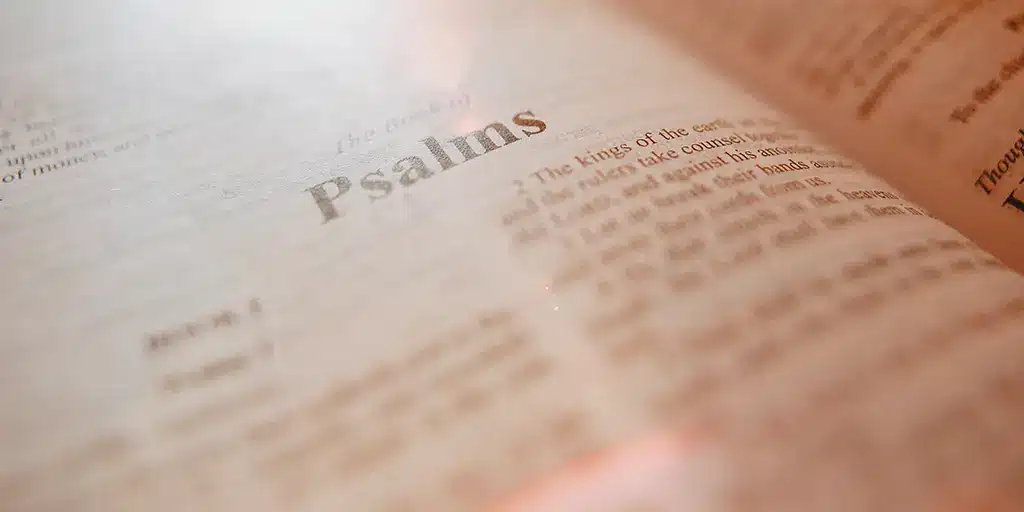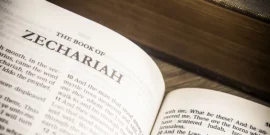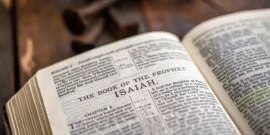Hints of the Trinity in the Old Testament (Part 3): Psalm 45

In our exploration of how the Trinity is foreshadowed in the Old Testament, we turn our attention to Psalm 45. This royal wedding psalm provides a remarkable glimpse into the divine nature of the Messiah and the distinction of persons within the Godhead, offering another clear example of how the Old Testament hints at the Trinity.
Here is Psalm 45:1-7. See particularly the last section in bold:
“My heart is stirred by a noble theme as I recite my verses for the king; my tongue is the pen of a skillful writer. You are the most excellent of men and your lips have been anointed with grace, since God has blessed you forever. Gird your sword on your side, you mighty one; clothe yourself with splendor and majesty. In your majesty ride forth victoriously in the cause of truth, humility and justice; let your right hand achieve awesome deeds. Let your sharp arrows pierce the hearts of the king’s enemies; let the nations fall beneath your feet. Your throne, O God, will last for ever and ever; a scepter of justice will be the scepter of your kingdom. You love righteousness and hate wickedness; therefore God, your God, has set you above your companions by anointing you with the oil of joy.” (Psalm 45:1-7)[1]
Let’s explore how this passage indicates the Messiah’s divine essence and His distinct personhood:
The passage presents a king who exhibits several divine attributes:
- Divine Address: Most strikingly, the psalmist directly addresses the King as “God” (Elohim): “Your throne, O God, will last for ever and ever” (Psalm 45:6). This direct address is unprecedented in the Old Testament, where “Elohim” is exclusively reserved for the one true God, as emphasized in Isaiah 45:22: “For I am God, and there is no other,” and Isaiah 43:10-11: “Before me no god was formed, nor will there be one after me.” By applying this divine title to the King, the psalmist is not merely elevating the subject to divine status but is declaring Him to be God Himself—the only God.
- Eternal Reign: “Your throne, O God, will last for ever and ever” (Psalm 45:6). Unlike earthly dynasties that rise and fall (Daniel 2:21), God’s throne is eternal, a sovereign reign that belongs to Him alone (Psalm 9:7, 145:13; Lamentations 5:19; Daniel 4:34). This eternal kingship underscores the divine nature of this King, whose reign transcends time and history.
- Divine Justice: “a scepter of justice will be the scepter of your kingdom” (45:6). This description echoes attributes consistently associated with God’s own rule in the Old Testament (e.g., Psalm 89:14; 97:2).
These divine descriptions make it clear that this king is no ordinary monarch but shares in the very essence of God.
Distinct in Person
Intriguingly, the passage also hints at a distinction of persons within the Godhead:
- Distinct Anointing: “therefore God, your God, has set you above your companions by anointing you with the oil of joy” (45:7). Here the King, who has just been addressed as “God,” is said to have His own God anoint Him. This creates a fascinating interplay where the divine king is distinct from, yet in relationship with, God.
- Distinct Blessing: “since God has blessed you forever” (45:2). This phrase suggests a relationship between the excellent King and God, implying a distinction while maintaining the King’s divine nature.
The apparent tension between God’s oneness and the duality presented in this psalm sets the stage for a profound mystery—one that finds its ultimate resolution in the doctrine of the Trinity.
Fulfilled in Christ
The New Testament explicitly applies this psalm to Jesus, confirming its Messianic and divine implications. The author of Hebrews quotes Psalm 45:6-7 in Hebrews 1:8-9, directly applying it to Christ:
“But about the Son he says, ‘Your throne, O God, will last for ever and ever; a scepter of justice will be the scepter of your kingdom. You have loved righteousness and hated wickedness; therefore God, your God, has set you above your companions by anointing you with the oil of joy’” (Hebrews 1:8-9).
By framing the quote with “But about the Son he says,” the author of Hebrews clearly identifies Jesus as the divine King in the psalm. This serves a dual purpose:
- Affirmation of Christ’s Deity: It affirms Christ’s full deity by applying the title “God” and ascribing to Him an eternal throne, signifying divine authority that belongs exclusively to God. Thus, the author of Hebrews reveals that the same God who reigns eternally in the Old Testament is present in Jesus Christ.
- Recognition of Distinct Personhood: The phrase “God, your God, has set you above your companions” preserves the distinction between the persons of the Trinity. While Christ is fully divine, He is also in relationship with God the Father, who anoints and exalts Him. This maintains the complexity of the Godhead, where unity in essence coexists with diversity in persons.
In Hebrews 1, this interpretation is pivotal, emphasizing the Son’s unique status as both fully God and the perfect mediator between God and humanity. The author uses this psalm to link Old and New Testament revelations, showing that Christ’s divine kingship was always embedded in Scripture, awaiting its full revelation in Him.
Conclusion
Psalm 45, with its portrayal of a divine yet distinct Messianic figure, offers another clear example of how the Old Testament contains glimpses of the triune nature of God. This royal wedding song, when viewed through the lens of its New Testament fulfillment in Christ, becomes a profound testimony to the consistency of God’s self-revelation throughout Scripture. It reveals how these once enigmatic passages, when illuminated by the coming of Christ, deepen our understanding of God’s nature and invite us to marvel at the intricate unity of His divine plan, where even a poem about a king’s wedding becomes a profound glimpse into the very nature of God Himself.
- All passages of Scripture are quoted from the NIV. ↑








